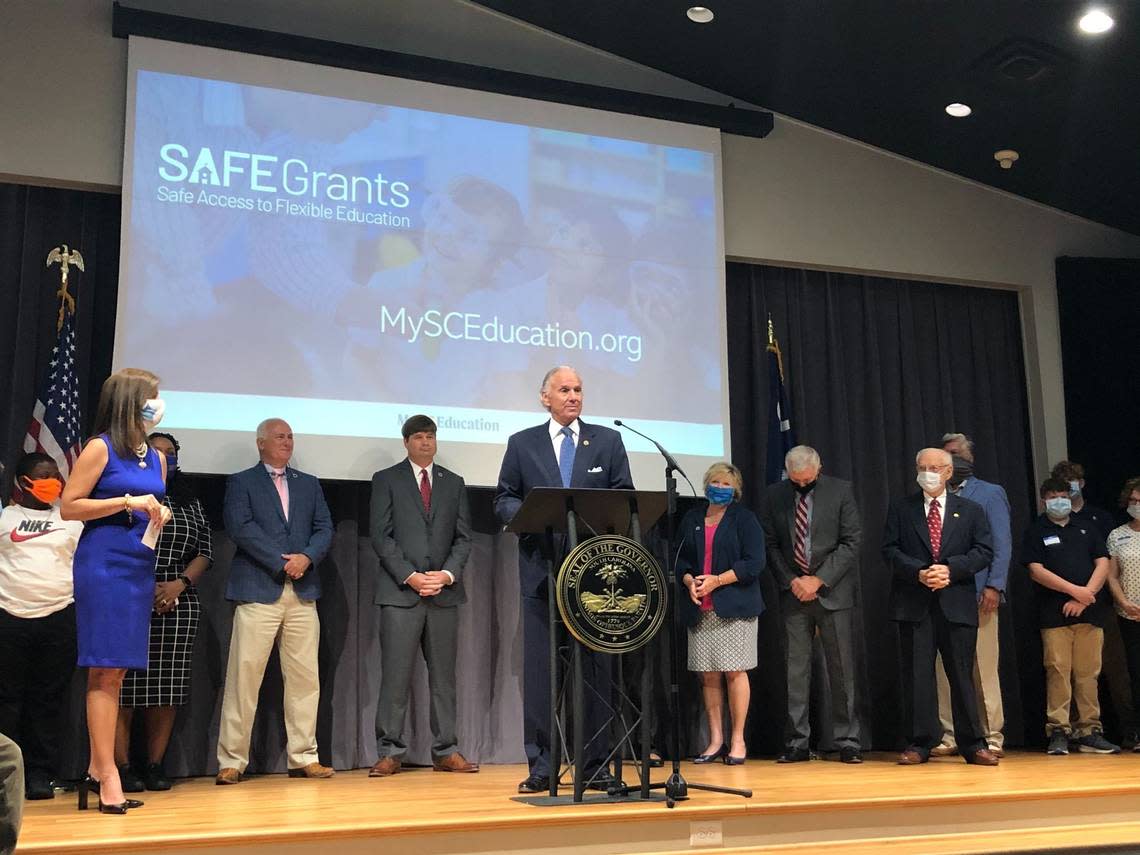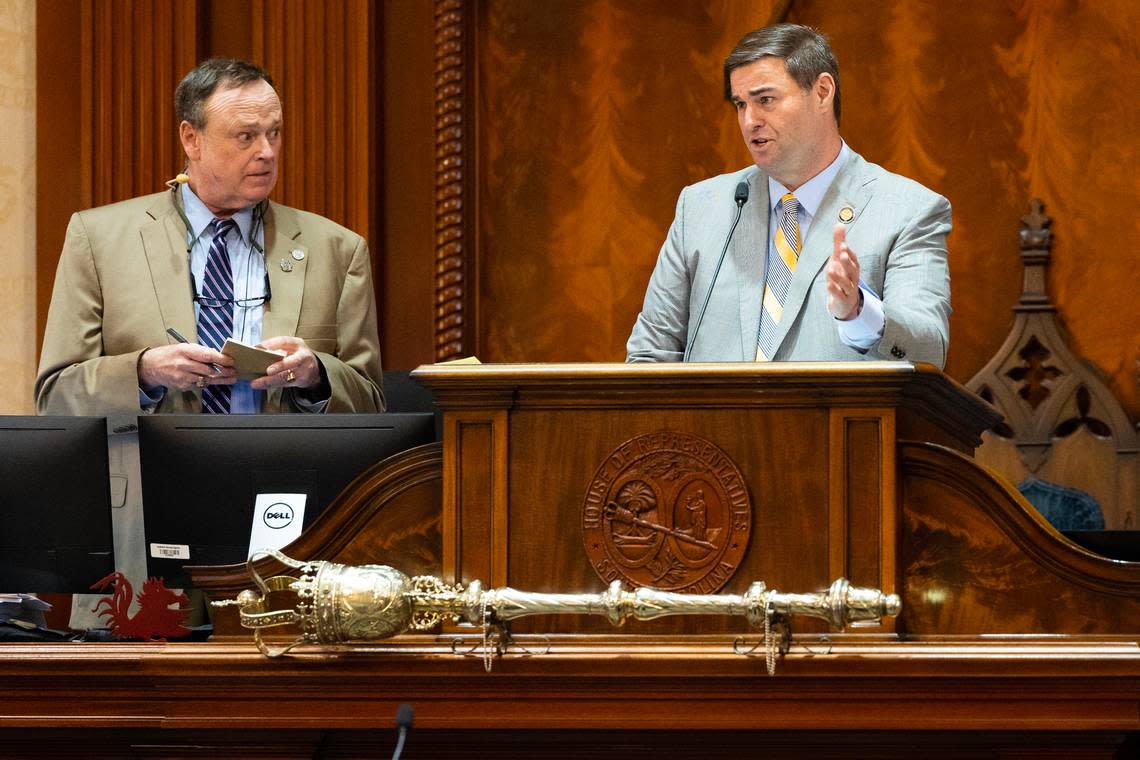SC Republicans seek constitutional change to allow funding of private, religious schools
For more than 150 years, South Carolina’s Constitution has, in some form or fashion, prohibited state dollars from flowing directly to religious schools.
It’s what prevented Gov. Henry McMaster from directing federal COVID-19 aid to private and religious schools in 2020, what lawyers cited to challenge the state’s 2022 appropriation of $1.5 million to a Christian education organization and what some argue invalidates school voucher programs.
Frustrated with the state Supreme Court ruling that struck down the governor’s 2020 tuition grants proposal and focused on expanding private school choice this legislative session, Republican state lawmakers are aiming to repeal the state Constitution’s “no aid” provision.
House Speaker Murrell Smith, R-Sumter, has introduced legislation that would strip from the state Constitution the section that prohibits public dollars from being used for the direct benefit of religious or other private educational institutions.
Smith said he was motivated to amend the Constitution by the South Carolina Supreme Court’s decision in Adams v. McMaster, the 2020 tuition grants case, which he said “has dangerous and far-reaching implications.”
“I am concerned that we’re going to lose things that are woven into the fabric of our education process in South Carolina over an amendment created back in the (1860s),” he said.
McMaster supports the effort, saying Jan. 6 that the “no aid” provision “inhibits” South Carolina from providing all students with the best possible education.
Public school advocates, on the other hand, oppose the repeal because they fear it would accelerate the diversion of tax dollars to private and religious schools and harm public education in the process.
“I don’t view opposition to this proposal as anti-private or anti-independent schools,” said Patrick Kelly, director of governmental affairs for the Palmetto State Teachers Association. “PSTA’s opposition is grounded in an overarching support for the state to meet its obligation to ensure every child has access to a free public education.”

‘No aid’ clause repeal would clear way for school vouchers
A constitutional change like Smith is proposing requires two-thirds support of each legislative chamber and the approval of a majority of voters in the next general election.
If voters pass a constitutional amendment, it returns to the General Assembly for ratification, which requires a simple majority vote.
Repeal of the “no aid” provision, which some call the Blaine amendment — named for the Maine congressman who unsuccessfully proposed it as an amendment to the U.S. Constitution in the 1870s — would eliminate any lingering doubts about the constitutionality of Republican-backed education scholarship accounts, or ESAs.
Those scholarship accounts are publicly-funded accounts parents can tap to pay for educational expenses, typically tuition, at private or religious schools.
Establishing an ESA program in South Carolina has been a Republican priority for years. It has yet to become a reality, but Republican leaders say it will be an early session priority.
A Senate Education panel on Thursday advanced ESA legislation that would create an education scholarship trust fund from which qualifying K-12 students could receive up to $6,000 annually for educational expenses. The Senate plans to begin debating the bill — which is identical to one it passed last year — on the floor Tuesday, Senate Majority Leader Shane Massey, R-Edgefield, said.
Smith and other Republican lawmakers say they’ve crafted ESA legislation to comply with the state Constitution, but questions about its legality remain and any ESA bill approved prior to the passage of a constitutional amendment would likely face a court challenge.
“I want us to have school choice and if it ends up proving that there is no way to do school choice without repealing (the Blaine amendment) then I believe that is what we should do going forward,” said House Majority Whip Brandon Newton, R-Lancaster, one of five Republican cosponsors to the constitutional amendment bill.
Smith denied his proposal to amend the Constitution had anything to do with clearing the way for ESA legislation. Instead, he said, it was motivated by fears the state Supreme Court’s nullification of McMaster’s tuition grant program could be used to undermine numerous state-funded programs — such as higher education tuition grants, lottery scholarships and early childhood and afterschool education programming — that also direct tax dollars to private or religious institutions.
“We have wonderful programs in this state doing great things for children,” he said. “If a court comes in and says the state of South Carolina can’t have these successful programs because they’re ‘to a religious entity’ then it’s going to set us back decades in the way we are helping educate our children.”

Interpreting the state Constitution’s ‘no aid’ clause
Derek Black, a law professor at the University of South Carolina and one of the nation’s foremost experts on education law, said Smith’s concerns are legitimate, but asserted the Supreme Court had largely allayed them in its Adams v. McMaster ruling.
The high court in that case distinguished between the governor’s proposed private school tuition grants for K-12 students — which it found unconstitutional — and existing state-funded scholarships that college students may use to attend either public or private universities.
PSTA’s Kelly said he interprets the state Constitution’s “no aid” clause to apply solely to K-12 education.
If someone had wanted to challenge the constitutionality of the state’s pre-K or higher education funding mechanisms, Kelly said, they would have done so by now. In fact, the 2020 lawsuit filed over McMaster’s private school tuition grants did not contest the federal COVID-19 aid he awarded to historically Black colleges and universities, some of which are private. The governor chose to withdraw that aid, but wasn’t legally compelled to.
Speaker Smith acknowledged there had been no threatened challenges to the state’s non-K-12 funding of private education entities, but said lawmakers have nonetheless been loath to appropriate money to private universities in wake of the Adams ruling.
“(The ruling) had some chilling effects on the way we budget in this state and how we educate our children in this state,” he said.
Kelly suggested that if state lawmakers are concerned the ruling could threaten non-K-12 education funding, they should amend the state Constitution to clarify that it doesn’t apply in such settings, rather than simply repealing the provision.
Consequences of a constitutional amendment
If the “no aid” provision is repealed, public education advocates warn, the consequences could extend well beyond the creation of an education scholarship trust fund for needy students.
Without a prohibition against the direct funding of private or religious schools, lawmakers could theoretically cut checks to every private and religious school in the state, if they wanted to, Black said.
“The ESAs, as currently structured, are an attempt to circumvent the Constitution as it currently exists. (Lawmakers) think that this may thread a needle,” he said. “But there will be no needle to thread if they repeal (the ‘no aid’ clause).”
In such a scenario, the state could fund private and religious schools through a budget line item, like it does public schools, and the federal Establishment clause, which prohibits the government from making any law “establishing” a religion, would not prevent it, Black said.
Smith denied that lawmakers have anything like that in mind, calling it a “far stretch.”
“I don’t see us creating and establishing private schools,” he said. “I don’t think that could happen.”
Kelly agreed that a repeal of the “no aid” clause wouldn’t lead to something quite so extreme, but said he was concerned the diversion of state dollars to private and religious schools could harm public K-12 education.
“At the end of the day, budgets are finite and you can’t fund everything under the sun,” he said. “The constitutional obligation on the General Assembly is to fund a free public education to every child that is minimally adequate, as defined by South Carolina Supreme Court, and that must be the priority.”
Daniel Suhr, an attorney for the Chicago-based Liberty Justice Center, disagreed that repealing the “no aid” clause would negatively impact public education in South Carolina and called it a “flawed starting point” to assume that education funding was a zero-sum proposition.
“First and foremost, it’s going to help students and parents by opening the door to greater educational options,” said Suhr, who represented state Superintendent Ellen Weaver’s Palmetto Promise Institute in the Adams v. McMaster case. “This is really about ensuring that every student has access to the best school for that child and about ending discrimination against faith-based and independent schools.”
Suhr said elimination of the constitutional prohibition, which he and other critics claim was borne of anti-Catholic bigotry, is long overdue, and rejected the notion it applied only to K-12 schools.
“We saw two years ago that independent and religious K-12 schools were denied access to emergency COVID relief funds based on this provision and we saw HBCUs in South Carolina denied access to emergency COVID relief funds because of this provision,” he said. “That discrimination against those independent and faith-based schools would finally come to an end.”
What are bill’s chances of passage?
Even with a two-thirds Republican supermajority in the House — 88 of 124 members — and a near supermajority in the Senate — 30 of 46 members — the proposed constitutional amendment likely faces an uphill battle.
In the event both chambers pass the amendment, it would still need to win approval of a majority of the state’s voters.
Attempts in other states to repeal similar constitutional provisions or enact sweeping voucher legislation that would permit tax dollars to be spent on private and religious schools have universally been turned back by voters.
“No statewide measure on vouchers put to the voters has ever succeeded anywhere,” Black said.
While a rejection by voters clearly “sends a message,” Sen. Massey said, it’s unlikely such a defeat would deter Republican lawmakers from pushing ahead with ESA legislation.
Newton said he’d vote in favor of school vouchers, regardless of the outcome of a ballot initiative, and believes the state can legally enact private school choice legislation without a constitutional amendment.
“If voters ever disagree with my decisions they have the right to change their representative every two years,” he said. “But I believe the voters would agree with us, that school choice is something we need in South Carolina.”
Reporter Joseph Bustos contributed.
